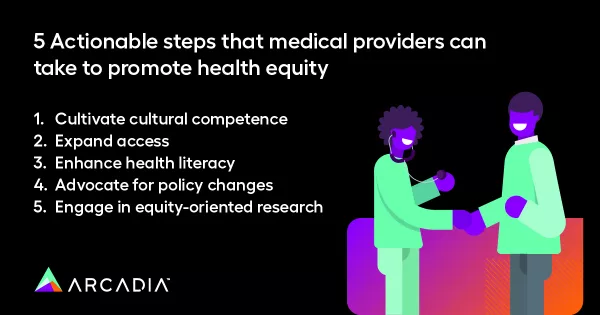Health equity: Promoting fairness and access in healthcare
In healthcare, it’s crucial to understand and embrace the concept of health equity. For medical providers, that’s especially true. Health equity goes beyond equal healthcare provision and focuses on eliminating disparities, ensuring fair access to healthcare services for all individuals. Here, we’ll explore the significance of health equity and provide actionable steps to promote it in everyday medical practice, whether you’re serving an urban community impacted by housing insecurity or a vast rural area with SDoH concerns like transit or social isolation.
What is health equity?
Health equity refers to the principle of achieving equal health outcomes for all individuals, regardless of their social, economic, or demographic backgrounds. It recognizes that some individuals may face unique barriers to healthcare, such as limited financial resources, geographic location, or systemic discrimination. Medical providers have a responsibility to address these disparities and work towards a more equitable healthcare system. By doing so, they can improve health outcomes, reduce health disparities, and enhance the overall well-being of a patient population.
Identifying disparities in health equity
To promote health equity, the first step is identifying existing disparities within a patient population. Collecting and analyzing data related to demographics, socioeconomic status, and health outcomes can help pinpoint areas of concern. By understanding these disparities, healthcare organizations can tailor their services to meet the specific needs of underserved communities and marginalized populations. Additionally, it is essential to recognize the social determinants of health, such as poverty, education, and housing, which significantly impact individuals' overall health status.

Taking action for more equitable healthcare
The good news? There are actionable steps that medical providers can take to promote health equity:
- Cultivate cultural competence: Develop cultural awareness and sensitivity to provide patient-centered care that respects diverse backgrounds, beliefs, and values. Communicate effectively and sensitively with patients from different cultural backgrounds to foster trust and understanding.
- Expand access: Increase access to healthcare services by reaching out to underserved communities. Establish partnerships with community organizations, offer telehealth services, and provide transportation assistance to ensure patients can access care conveniently.
- Enhance health literacy: Educate patients about their health conditions, treatments, and preventive measures using plain language and visual aids. Empower patients to actively participate in their healthcare decisions and advocate for their needs.
- Advocate for policy changes: Engage in advocacy efforts to promote policies that address health disparities and improve access to quality healthcare for all. Collaborate with local, state, and national organizations to bring about systemic changes that support health equity.
- Engage in equity-oriented research: Support and participate in research that investigates health disparities and explores effective interventions. Use research findings to inform evidence-based practices and implement strategies to reduce disparities within your practice.
The path to more equitable care starts with a data point
Health equity is a fundamental principle that impacts medical providers across the field, no matter their specialty or population. By actively addressing disparities, expanding access, and promoting cultural competence, providers and administrators can work towards a more equitable healthcare system. Embracing health equity not only improves patient outcomes but also contributes to a healthier, fairer society overall.
Check out the resources below to learn more about how health equity is woven into the fabric of healthcare data analytics, and how you can leverage technology in service of happier, healthier days for all.
